[
Mughayr al-Deir captures the West Financial institution – On January 23, villagers in al-Muarrajat woke as much as discover three child-sized burial mounds close to their youngsters's college. The message was clear: Go away, or die.
Based on Alia Mleihat, 27, the pretend graves unfold “intense concern, nervousness and terror” within the village – a gaggle of 30 herder households, all of whom had been associated.
He mentioned, “The (tombs) that the settlers have positioned in Al-Muarrajat are a direct menace from these demons (which) might be applied in the present day or tomorrow as a result of whoever constructed them passes by the village every single day.” Is.”
However even after this newest settler's menace on their lives, the folks of al-Muarrajat stay undaunted.
“Those that did this have to be held accountable… We’ll stand our floor till we die, that doesn't scare us,” Alia mentioned.
“Quite the opposite, it calls us to persevere much more.”
Phrase shortly reached the villagers' cousins in Mughayr al-Deir – who had been additionally from the Mleihat clan – of what had occurred. Though it felt chilly, it was no shock, contemplating what they had been additionally experiencing.

final of the bedouin
In a sequence of violent massacres by settlers in Space C of the occupied West Financial institution because the Israel-Hamas battle started on 7 October, nearly all Bedouin villages east of Ramallah alongside the Allon Street – the rugged terrain of which is now occupied by Israel – had been destroyed. Possession is seen as an integral a part of desires. Proper – had been the targets of compelled displacement by armed settlers, typically sporting army uniforms.
Humanitarians on the bottom on the time advised Al Jazeera that 5 al-Muarrajaat households have left, and extra are anticipated to reach and transfer to Mughayr al-Deir – which is situated even nearer to Allan Street than al-Muarrajaat – may even go, as a consequence of which the displacement can be accomplished. of Palestinians within the space.
However, 4 months later, the folks of al-Muarrajat and Mughayr al-Deir stay on their land.
Based on leaders and members of those pastoral communities, they stayed regardless of threats and restrictions to protect their Bedouin way of life – and since they’ve nowhere else to go.
Ibrahim Mleihat, 58, often called “Abu Muhammad”, is the mukhtar, or elected chief, of Mughayr al-Deir, on a hill a couple of 90-minute stroll from al-Muarrajat, with Alan on one facet. Street and surrounded by different locations. By encroaching settlers, together with the settlement of Maale Mikhamas and the outpost of Mitzpe Dani.
As rain and hail beat down on his household's tent, Abu Mohammed served espresso to his grandson whereas the older man spoke to Al Jazeera, a photograph of his father hanging on the wall. A lot of the space outdoors the village was turning into mud.
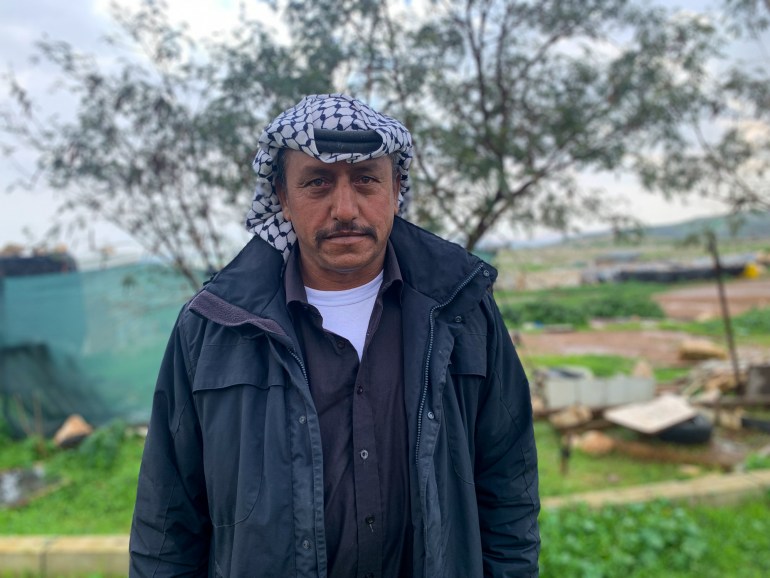
Abu Muhammad described how circumstances in Mughayr al-Deir started to deteriorate three years in the past as settler outposts first appeared in the course of the earlier Israeli authorities led by Yair Lapid and Naftali Bennett.
As occurred in Bedouin villages elsewhere in Space C – land beneath Israeli army management set to be negotiated in future peace talks – the harassment that the villagers of Mleihat had skilled for years elevated after October 7.
Abu Mohammed, 37, and his son Ibrahim Mleihat mentioned settlers started monitoring them with drones, utilizing loudspeakers to shout abuses about Islam or flip up the amount to scare away their flocks. Armed settlers attacked them and prevented them from grazing their sheep on the land. Getting used for years, they had been being penned.
Settlers additionally attacked Mughayr al-Deir households once they tried to succeed in their solely water supply down the street – a journey made needed as a result of Israeli authorities prevented them from accessing water on to their neighborhood.
The safety forces additionally harassed the villagers. Regardless of an official settlement with the Israeli water firm Mekorot, they prevented the villagers from straight accessing the water supply, and required them to first cross by a flying checkpoint.
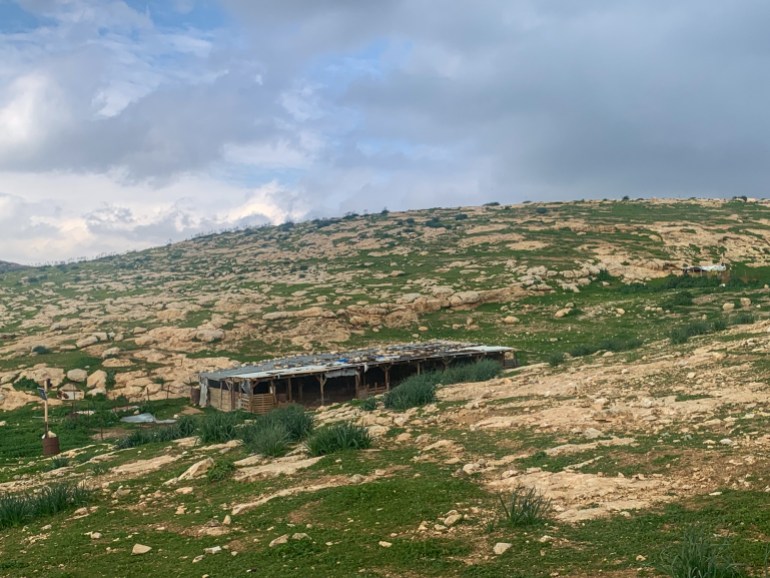
'We’re the federal government'
In Mughayr al-Deir, organized settler assaults reached a peak on 28 December, Abu Muhammad and Ibrahim mentioned. That morning, dozens of armed residents in army uniforms and lined faces got here to the village, attacked homes and advised Abu Muhammad that the villagers ought to go away.
“That is our territory,” he declared.
Abu Muhammad replied, “We’ll by no means go away.”
When some villagers defended themselves of their properties, the settlers fired on the bottom in the direction of Abu Muhammad and his sons. When the matter escalated, he known as the police.
A safety guard at a close-by squatter settlement – the alleged ringleader of the assaults – advised Abu Muhammad, “Don't trouble calling the police.” “We’re the federal government.”
When the police arrived, the settlers claimed that it was the Bedouins who had attacked them. Abu Muhammad and his 5 sons had been arrested.
“Why are you arresting us when they’re attacking us in our properties?” Abu Muhammad requested angrily.
They had been taken to Ofer jail, he mentioned, the place they had been overwhelmed and stored in chilly cells with out water or meals for lengthy durations of time.
It took 10 days to launch them regardless of there being no proof towards them and every of them needed to pay 10,000 shekels (about $2,750) for his or her launch and 10,000 shekels for a lawyer. Additionally they needed to signal a pledge to pay a 50,000-shekel (about $13,730) wonderful in the event that they “tried violence” towards the settlers.
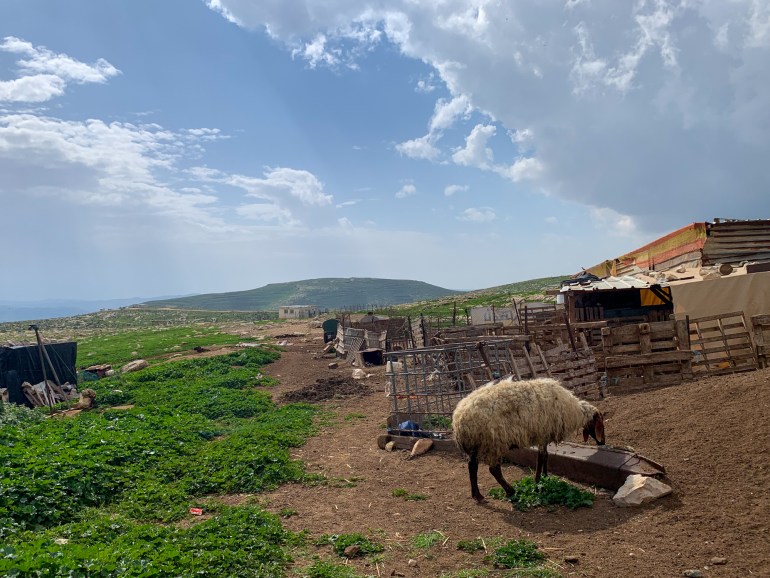
'We will not graze in every single place'
The fabric and psychological state of affairs of the Mughayr al-Deir and al-Muarrajat households is deteriorating as their isolation continues greater than 4 months into the warfare.
Threatened with expropriation by settlers and authorities in the event that they graze their sheep on conventional lands, villagers go away their lands solely to fetch water from the street or purchase fodder, Abu Muhammad says.
Usually, the wet winter season supplies grass for herds to graze on, saving some huge cash. However, he says, they nonetheless purchase a ton of animal feed each different day as a result of settlers forestall them from going out to graze.
“After which the settlers come to our land with their sheep and goats, and begin grazing in every single place the place we will't go,” he mentioned.
These burdens are compounded by the pressure on the occupied West Financial institution's economic system throughout essentially the most worthwhile time of the 12 months, which forces Palestinian households to spend cash on fundamentals equivalent to rice and flour moderately than on cheese, yogurt and meat offered by herders. Is forcing.
To stay financially viable, households in Mughayr al-Deir are turning to debt out of desperation.
“Each family right here is now greater than 30,000 shekels (about $8,240) in debt,” mentioned Abu Mohammed, whose neighborhood lives with out working water and really restricted electrical energy.
“I can't even take into consideration the longer term,” he mentioned, struggling day after day to steer the neighborhood throughout this disaster.
“I can solely adapt to the state of affairs and take into consideration how we’ll cowl the price of residing.”
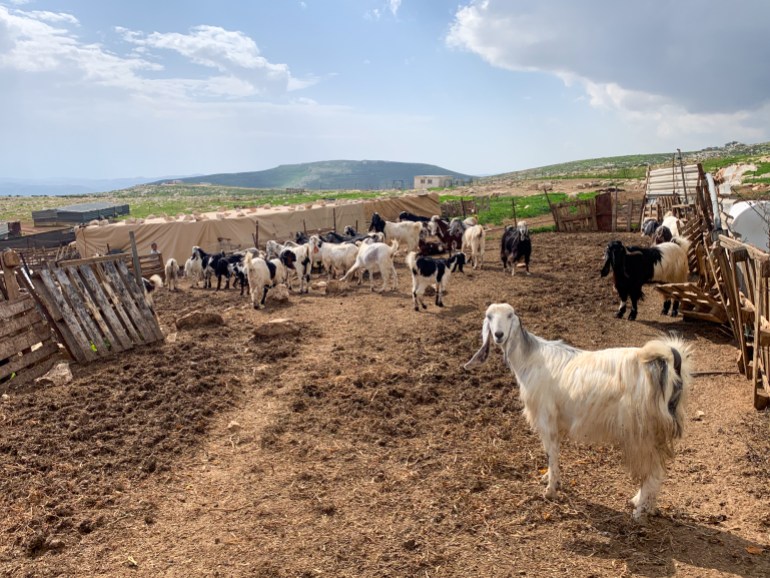
value of residing
Folks in each Mughayr al-Deir and al-Muarrajat are combating financial circumstances in addition to an absence of companies.
A cell well being clinic that served Mughayr al-Deir stopped coming because of the settlers. An aged villager affected by a continual sickness advised support staff that she didn’t attend important medical visits in Ramallah as a consequence of concern of settlers.
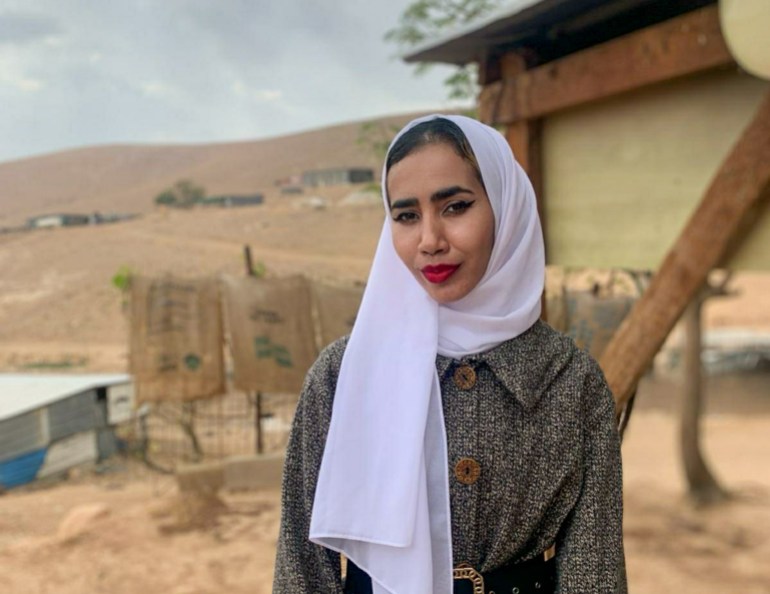
Till lately, the varsity in al-Muarrajat, which can also be attended by youngsters from Mughayr al-Deir, was closed within the interval following the beginning of the warfare on 7 October. Aliya Mleihat – who taught herself highschool earlier than attending the Open College in Jerusalem – taught classes with village youngsters utilizing books donated by activists.
He mentioned, “As Palestinians, our weapon is data… With data, we will make our voices heard to the world.”
In mid-January, college resumed, however youngsters nonetheless confronted frequent college closures and dangers in going to high school. Three of Mughayer al-Deir's 30 youngsters have already dropped out of college.
Different Bedouin villages close to Allen Street are actually abandoned or in instances like Wadi Sik, even taken over by Israeli settlers, with the isolation having a adverse impression on the 2 remaining communities.
Assaults and restrictions on youngsters have been significantly harsh. Ibrahim Mleihat has six youngsters aged between one and 12 years.
“We attempt to misinform children: 'Don't be afraid, they'll go away,'” he mentioned. “However our kids know we’re mendacity. They’ll see it in our eyes.”
In Mughayr al-Deir, villagers describe how youngsters typically talk about “Amir, Jadoun and Omar”, Israeli safety officers from the close by Ma'ale Mikhamas settlement, and the Mitzpe Dani checkpoint.
“Kids dream that (safety officers) will kill them or take them away,” Abu Muhammad mentioned.
A mom in Mughayr al-Deir described her six-year-old daughter as clever and eloquent till the ultimate settler assault on support staff left her largely silent and unable to utter phrases.
Even within the painful, economically crippling state of affairs they discover themselves in, the Mleihat of Mughayr al-Deir and al-Muarrajat say they won’t go away.
Abu Mohammed has heard from displaced communities how bleak their prospects are, that they, like the previous neighborhood in Ain Samia, are struggling, damaged and scattered throughout Space B.
It has turn into not possible for such communities to make a residing as herders, with the one choice being to promote their animals and discover jobs as laborers – at a time when roads within the occupied West Financial institution are harmful, Palestinians have expanded their motion and Extra restrictions have been imposed, and the economic system is in disarray.
And whereas another communities had someplace to flee to land, Abu Muhammad insists they’ve nowhere else to go.
Abu Muhammad mentioned, “Both we can be killed right here, or we can be given another.” “However we’ll by no means go away.”
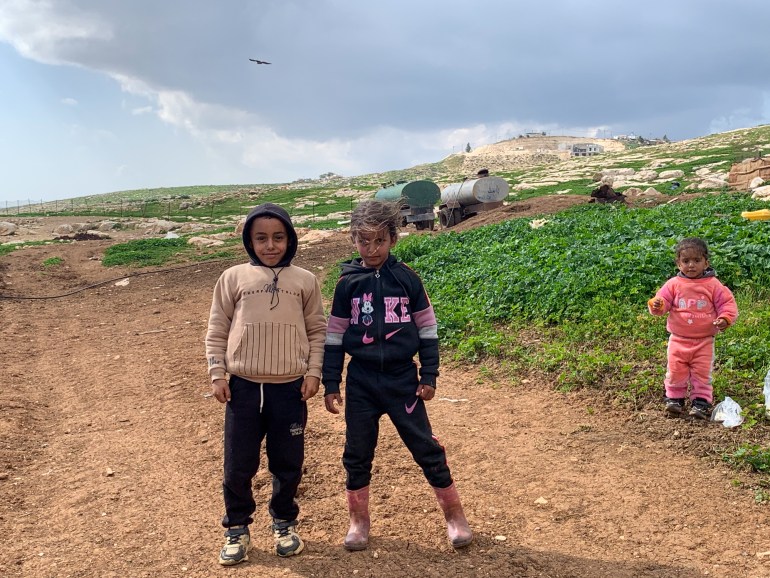
Nevertheless, regardless of being separated by a 90-minute stroll or 10-minute drive, the folks of Al-Muarrajat and Mughayr Al-Deir have gone a number of months with out seeing one another because of the settlers; When a relative of Aliya tried to journey to Mughayr al-Deir, settlers set his automobile on fireplace.
Nevertheless, the bodily remoted villages stay in fixed contact, forming the one neighborhood residing within the space – and supporting one another as household.
“I discuss to them nearly every single day about what's happening there,” Alia mentioned of her Mughayr al-Der family members.
“They’re courageous individuals who defended themselves and stood their floor.”

